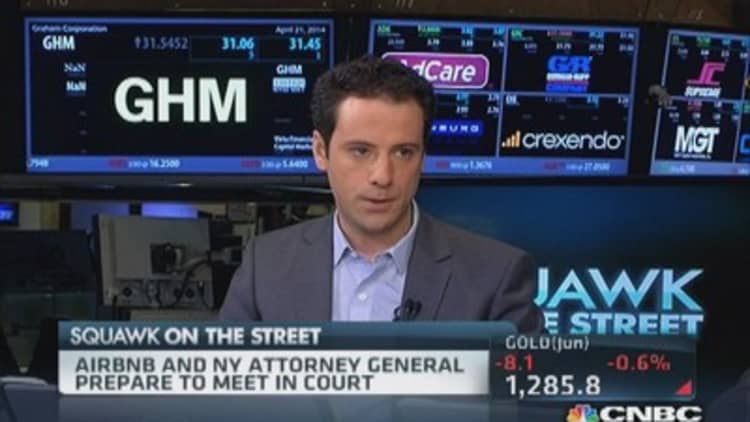Airbnb and the New York State Attorney General's office are expected to square off in court Tuesday over a case that has been back-and-forth since October when AG Eric Schneiderman issued a subpoena seeking details on thousands of people he suspects are renting out rooms illegally.
"It is illegal for residents of Class A [multiple dwelling] buildings to rent out their apartments for any period of time less than 30 days unless they are also present in the apartment," the AG's office states in its November rebuttal to Airbnb's attempt to quash the subpoena.
The court date has been postponed for several months, and Airbnb has said it is negotiating with the state to find a way to start collecting hotel-type taxes on behalf of the tourists and other short-term renters looking for something cheaper or more unique than the city's 500 hotels.
But New York City has rules on who is allowed to rent out any or all of their home to short-term renters of less than 30 days and makes clear whether taxes must be paid. For its part Airbnb, has said a New York state law prohibits the company from collecting those taxes on behalf of its users. If it was allowed, Airbnb estimates the annual revenue for the city and state would be $21 million.
An affidavit filed Monday by the Schneiderman's office is based on the research of Sumanta Ray, the director of research and analysis with the Investor Protection Bureau of the New York State Attorney general. He found that as of Jan. 31, there were 19,522 NYC listings on Airbnb with 15,677 unique hosts. Although most people had only one listing, 1,849 hosts had multiple listings -- that 12 percent accounted for 30 percent of all the NYC listings on the site, he found.
In addition, only one of all those listings required a minimum stay longer than 30 days.
Airbnb has said it is already taking action to weed out the bad apples using its site. "Earlier this year, we began notifying these hosts that they and their more than 2,000 listings would be permanently removed from the Airbnb community. While we are allowing these hosts to support their existing bookings, all are now prohibited from accepting new reservations," the company said on its website.
"The New York Attorney General continues to say one thing and do another. He says he's interested in just a few bad actors. If that's true, he should ask us about them, and he'd find out they are already leaving our site," company spokesman Nick Papas said in an e-mail to CNBC on Monday.
The Attorney General's office puts the onus on Airbnb to weed out its own bad apples.

"Attorney General Schneiderman has worked in partnership with innovative tech companies like Facebook and Yelp! to curb illegal activity on their sites. It's disappointing that Airbnb has taken a different approach, resorting to name calling and public relations to confuse the issue. Airbnb is simply looking out for its bottom line at the expense of a law that protects quality of life for building residents and safety for tourists." Matt Mittenthal, a spokesman for Schneiderman told CNBC on Monday.
The judge could rule on the subpoena as early as Tuesday.
"If we are ordered to hand over any data, we will work to ensure you are properly notified before the government receives any information about you or your listing," Airbnb said in a letter Sunday to its hosts. "No matter what happens in the courtroom, we'll be holding a community meetup in New York City on Wednesday at 7:00 PM and a webinar on Thursday at 11:00 AM."
New York wouldn't be the first location where Airbnb users are paying hotel-type taxes.
Those charges are now in the works in both San Francisco and Portland, Ore. And in Palm Springs, Calif., more than 1,300 residents already have the $200 annual permits that allow them to rent out all or a portion of their home throughout the year. Those permit holders are required to pay the 11.5 percent transit occupancy tax, submit monthly reports, adhere to rules about occupancy limits and trash pick-up and post their permit number on all advertising for their rental. "We do sleuth," James Thompson, the Palm Springs City Clerk said, referring to online efforts to make sure advertised properties are in compliance.
For Palm Springs, that's an extra $3 million per year for city coffers, Thompson told CNBC. The rules have been in place since 2008 and just underwent a update that will take effect early in May, he said.
Follow Road Warrior on Twitter at @CNBCtravel.


